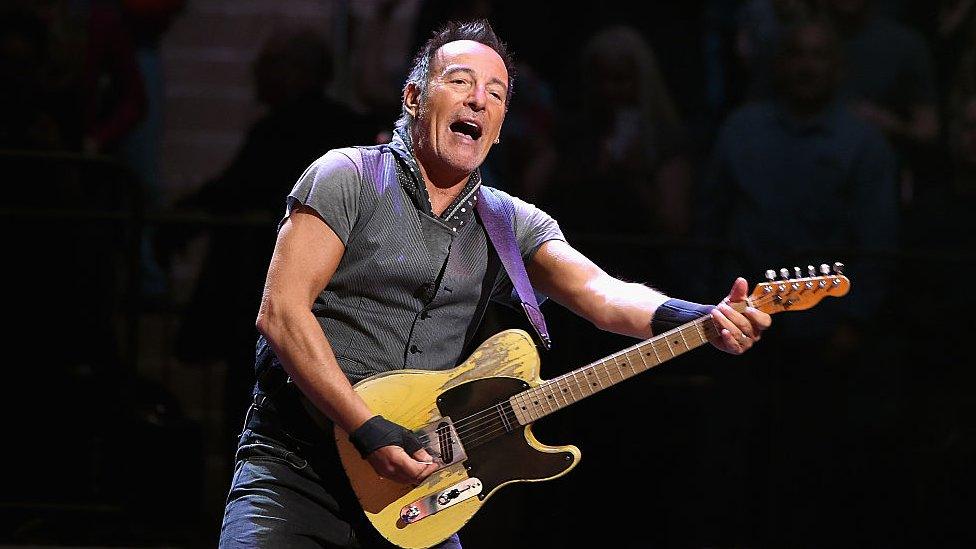Viewpoint: Why toilets matter to trans rights
- Published

Nicole and Wayne Maines
The ability to use toilets that match with one's gender has become a flashpoint in the fight for transgender rights in the US. Why are toilets so central to this cause? Activist Wayne Maines explains.
Last month, Charlotte, North Carolina passed a law to make sure their transgender residents could use the toilets of the gender they identified with - the gender they belong to. But then the state legislators of North Carolina has taken that away by passing a bill that gets rid of those protections state-wide, along with many other protections that made Charlotte a safer, more fair place for all.
Now, nowhere in North Carolina can a transgender person be sure they will not be forced into a toilet where they don't belong and in fact, where they may not be safe.
I am often asked why toilets are such a big issue. I don't have all of the answers, but I have a good idea of what these questions are about. When my daughter transitioned at ten years old and began using the appropriate toilet for her, adults in our community and across the state were very upset.
When I asked them what they were afraid of they said they were "concerned that the girls would see something they should not see." My genuine response was one of confusion. Really? You think kids are exposing themselves in the toilet?
It does not happen. Toilets have a natural order that promotes privacy. Public toilets for the most part are very private places; there are stalls and standard customs that put invisible walls of privacy all around us. We do not look at each other, we do not talk to each other; we do our business, hopefully have enough water and towels to wash our hands, and we leave.

Bruce Springsteen cancelled a concert in North Carolina in response to the new law.
Other public spaces, like crowded subway, elevators, concerts and sporting events, place us in close proximity to people from all walks of life. We are seldom afraid, nor do we try to pass laws to keep certain people away from us. It is part of our normal day.
There are existing laws in place to protect us from anyone causing trouble in a toilet. More importantly, there are simply no cases of a transgender person attacking or assaulting someone in the bathroom. A quick look at attacks on LGBT people, especially transgender people, show who is really targeted.
My daughter Nicole is now eighteen, but I still worry about her safety every day.
There's far more danger to her - a beautiful young woman in a dress and heels- being forced to use a male bathroom than her presence in a female toilet.
One of the reasons we defeated a "bathroom bill" in Maine was the legislature met people in the transgender community. They realized that these women do not belong in male toilets. The same goes for transgender males in women's toilets. How can you send a transgender male with a full beard into the women's toilet?
Nicole knew early on who she was - although it was difficult to find the right words. By third grade she still went by Wyatt, but she called herself a "girl-boy". Her teachers referred to her as "she". In fourth grade, she would say she was a girl trapped in a boy's body. For those years she used the girls' toilet in school without trouble. Her generation - the students she had grown up with, who spent the school day with her - didn't mind.

The Maines twins
But then, a group called the Christian Civic League of Maine got involved. One of their members told his grandson to start saying he should go into the girls' toilet too, even though he was not transgender. It started a media frenzy. The school decided my daughter should use the staff toilet.
That decision crushed her. It reinforced the idea she was neither a boy nor a girl - she was an "other."
It took away more than just her right to use the appropriate toilet. It took away her right to be a typical student or human being.
We sued the school for discrimination. Ultimately, in 2014, Maine's Supreme Judicial Court ruled the school had violated the state's human rights act and transgender students had the right to use the toilet of the gender with which they identified.
But our life hasn't been the same. We went into hiding from 2009 to 2011. My wife had to quit her job and we moved to a different town to keep our children safe. Sadly, until this year, I had only seen my family on weekends because I work so far away.
When states pass these bills, it has the effect of forcing people away from their homes and from their loved ones. When Nicole was looking at colleges, it was an eye opener for me. Of all the thousands of universities in the US, only 10% were welcoming to her, never mind which ones she actually wanted to attend.

Nicole and her twin brother
Toilet shouldn't be the issue. Transgender people just want to be average citizens and have the same worries everyone else has. Which movie am I going to see, instead of can I go to the movies? Can you imagine every minute of your day wondering where you're going to use the toilets next? It's not only a question of safety, but a question of how you can grow as a person if you're always thinking about where you can use the facilities.
While we are busy fighting about the basic right to use a restroom, bigger issues are being ignored. I'm worried about transgender people not having access to the right medical care, that they can be fired in many states for just being transgender. I want to fight for the things that will allow transgender people to enjoy life, to grow old, thrive and be happy - and that includes the right to use the toilet without fear.
Wayne M Maines is an activist, educator and father to twins Jonas and Nicole. His family is the focus of the best-selling book, Becoming Nicole: The Transformation of an American Family by Amy Ellis Nutt.